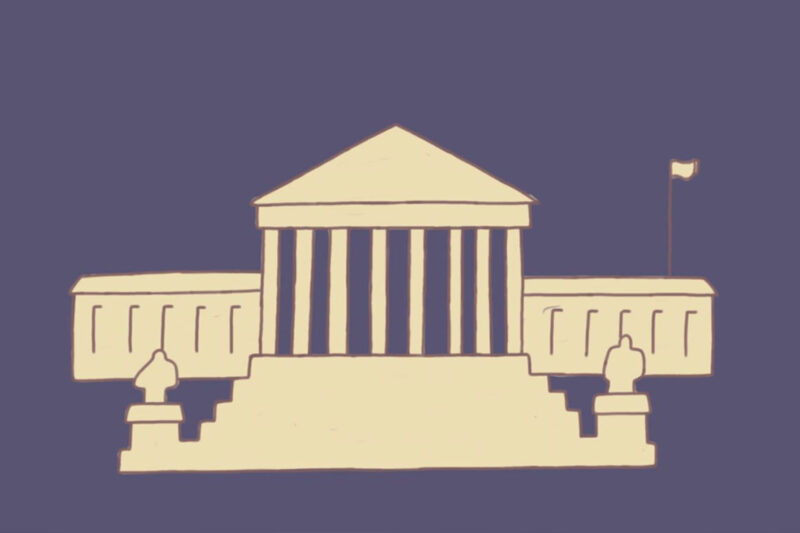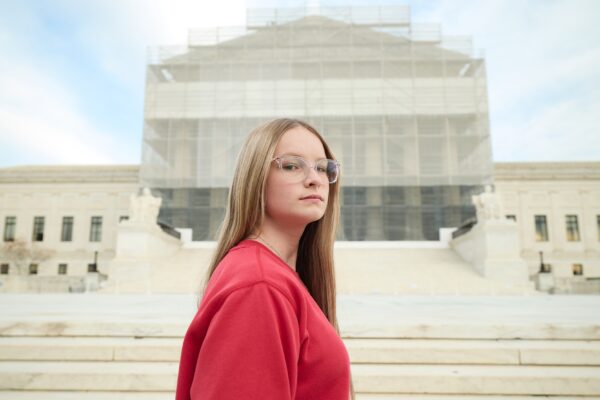
The United States Supreme Court just finished hearing arguments in what will likely be a landmark case about the viability of the nation’s civil rights laws. In Masterpiece Cakeshop v. Colorado Civil Rights Commission, the question is whether a commercial bakery has a constitutional right to refuse to sell to a same-sex couple a wedding cake that it would have sold to any straight couple.
The Background
The ACLU represents Dave Mullins and Charlie Craig, who were planning their wedding in 2012. With Charlie’s mom, Debbie Munn, they went to the Masterpiece Cakeshop bakery to talk about ordering a wedding cake. As soon as the bakery’s owner, Jack Phillips, learned that it was Dave and Charlie who were getting married, he refused to sell them any wedding cake, saying it violated his religious beliefs.
It’s long been the law in America that when a business opens its doors to the public, it has to be open to everyone. Colorado law, in fact, bars retail stores from turning people away from a business because of who they are, including based on race, sex, religion, disability, and sexual orientation or gender identity.
The bakery asserts that enforcing Colorado’s public accommodations law would force it to express support for a same-sex couple’s wedding, which would violate its constitutional rights to speech and religion. But Colorado law doesn’t require the bakery to create any particular cake or endorse anyone’s marriage. It simply requires that a business sell its products to both heterosexual and same-sex couples alike without discrimination.
The bakery, however, seeks a constitutional right to pick and choose its customers based on its religious views or simply its preference about who it considers acceptable as members of the public. Such a right would create a gaping hole in the nation’s civil rights laws, licensing discrimination whenever a business asserts a religious or expressive justification for the discrimination.
The Argument
In cases as divided and important as this one, it’s almost always difficult to get a good sense of how the justices will rule just from listening to the oral arguments. But here’s my take on what we heard from the court today.
At the outset, several justices made an explicit connection between civil rights cases from the 1960s and today. Through probing questions, Justices Sotomayor and Breyer pointed out that the court has never before accepted claims by businesses that their free speech or religion rights justified overriding nondiscrimination laws.
Importantly, those justices included Justice Kennedy, who could well be the swing vote in this case. Addressing the bakery’s free speech claims, Justice Kennedy made clear that he sees how a ruling for the bakery could license discrimination by businesses across the country. He asked U.S. Solicitor General Noel Francisco whether the bakery could put up a sign saying, “No wedding cakes for same-sex couples.”
When Solicitor General Francisco said the bakery could put up that sign if it said “no custom cakes,” Justice Kennedy suggested that such a sign would be an “affront to the gay community.” Clearly, he understands the harm of being turned away from a business because of who you are. He also talked about how, if the bakery wins here, other bakeries and similar businesses across the country could start more openly picking and choosing their customers based on identity. Those remarks suggest he agrees with Dave and Charlie that Colorado’s law should be enforced against the bakery.
But Justice Kennedy also expressed some concerns about the bakery’s freedom of religion claim. The Colorado Civil Rights Commission conducted an initial hearing in the case, and Justice Kennedy seemed to think it might have been biased against the bakery because of its owners’ religious beliefs. He pointed to the comment of one of the commissioners, who said:
“Freedom of religion and religion has been used to justify discrimination throughout history, whether it be slavery, whether it be the [H]olocaust, whether it be — I mean, we — we can list hundreds of situations where freedom of religion has been used to justify discrimination. And it has to be one of the most despicable pieces of rhetoric that people can use to — to use their religion to hurt others.”
He seemed to be exploring, through his questions, whether the court should remand the religion claim case back to the Colorado Civil Rights Commission to give it a chance to reevaluate the claim without what he may see as one Commissioner’s antipathy to the bakery’s religious views, perhaps by asking that Commissioner to recuse herself. In his final comments on the statements of one of the commissioners, Justice Kennedy said that he was concerned that the state had not been tolerant or respectful of the baker’s beliefs.
Some of the other justices explored the fuzzy line the bakery was drawing between products that the bakery’s lawyers said was speech — baking a cake — and conduct they said wasn’t speech, like cooking a meal, designing a building, or styling a person’s hair. They did not seem convinced that courts could make meaningful distinctions between such activities, despite the bakery’s efforts.
But Justice Kennedy is likely to be the key vote on this case. While much of what he said bodes well for the future of civil rights laws, we will have to wait for the court’s decision, which will be issued before the end of June, to see how it all comes out.


